|
We know there are many things that you just have to “learn as you go” as an author, and it’s especially difficult to think strategically when you are encountering every step of the process for the first time. It can feel like the publishing industry swirls with inscrutable mystery, but it really does get easier with experience. Seasoned authors and agents continue to learn new things every day too, and that’s part of the fun! We want you to begin 2024 feeling prepared and motivated, so we took time in January to impart some simple truths about publishing via our social media accounts. We’ve given advice that is practical, but potentially impactful, and in today’s blog post we’re including the complete collection of tips from January 2024 for your convenience. We hope you find them helpful! 1. Slow and steady wins the race.When that “final” draft is complete, it can be tempting to rush off and send it everywhere all at once, but building your career as an author is a long game. It’s good to pace yourself. Making small, measurable goals and then proceeding with intentionality and some prudence will give you the space you need to learn from your mistakes and pivot when necessary. Find that beta reader, curate your list of agents, build your social media platform and writing community. And don’t forget that a career is usually built on more than one book, so keep writing! This year, remember that the publishing industry isn’t going anywhere! Take your time, plan ahead, and produce your best work! 2. We all have the same, very limited, 24 hour days.You’ve probably heard it before – agents are swamped. We wish it was an exaggeration, but agents (and editors) are truly faced with an overwhelming number of submissions. The volume of manuscripts crossing our desks in a given week or year is exponentially more than we could accept even if it were possible to fit more work hours into the day. We get 24 hours and really do better overall when some of those are dedicated to eating, sleeping, and spending time with loved ones. Take encouragement from this! The waiting is normal, and most importantly, a “rejection” from one agent is not necessarily a reflection of your manuscript’s potential. It is a reflection of the difficult decisions we have to make about what we can afford to take on to our already-full list of responsibilities. 3. Platform matters. More and more often agents are hearing no-thank-yous from editors along the lines of, “The manuscript has potential, but I’m afraid that the author’s platform is not where it would need to be to help us with marketing.” It’s just the unfortunate reality that there are not enough people or hours in the day for publishers to give every book a robust marketing plan, and they are making their decisions in part based on whether or not the author has demonstrated the ability to do some of that legwork themselves. What does “platform” mean today? It can still vary by audience. Where are you likely to meet your readers? Speaking events? Professional organizations? In the pages of trade journals? Or social media? An author website and social media accounts are the most common starting place for connecting with your audience. 4. Response times are slower than ever.As we mentioned in an earlier post, agents (and editors) have seen a massive increase in the volume of submission over the years. Many of us receive no compensation for reading those submissions, but they are an essential part of finding quality projects to work on. Even so, we must prioritize our current clients and projects, and sometimes it just takes a very long time to clear space to consider new one. A long wait does not mean “no,” and it’s a good discipline to try not to read into the reason it’s taking so long to hear back from someone. Sometimes the delay is something as simple as one of us getting a cold that sets our schedule back. You want agents and editors to have the brain-space for your voice, so while waiting is hard it is ultimately worthwhile. And remember that when your book goes on submission with an agent, the waiting will resume – response times from editors are slower than ever. Practice patience now. 5. You need a hook.What makes readers want to read your book? Unless you are already famous, there will need to be something about your manuscript that is unique or unusual enough to grab the attention of readers in a very saturated market. If you can’t identify the thing or things that will grab readers and keep them, then it’s time to examine whether your manuscript is really as complete and creative as it could be. Without a hook you will likely receive feedback that it “feels too familiar” or “won’t stand out” among the competition. But don’t stress so much about inventing something never-before-seen as identifying what is special about what you’ve already created. Even though there is a chance you need to revise, it’s equally possible that you haven’t honed in on the hook in your description/pitch but that it’s there waiting to be found. Each story is unique because each writer is – which perspective, plot element, character detail, or topic is going to make readers stop and give your book a second glance? 6. It pays to plan your queries wisely.Querying can be time consuming, and you may be tempted to streamline by creating an impersonal query letter and sending it out widely. But you need to know that it’s more likely that you’ll find success faster if you research and target specific agents than if you send pitched out blindly and cross your fingers. Your manuscript will not be a good fit for many agents out there. Some do not represent your genre or age group at all. Some have very specific directions on their wishlists or websites about what they want to see (or not see) in a query. Take the time to create a submission plan that includes agents you genuinely feel to be a good fit for you, and then query in batches. You may receive feedback from agents in one round of submissions that affects your future submission practices for the better. It can take time to find an agent who is interested and available, but throwing spaghetti at the wall is little more than a waste of everyone’s time. 7. Unique, well-written books are still getting published and flying off shelves. We’d like to end this series on a hopeful note to remind you why you became interested in this author career path in the first place – good books are still being made! Publishing is alive and well, and there is room for more growth. Like every industry, it changes and adapts, but reading is still a beloved pastime that we think will endure. Create the very best manuscript and submission plan that you can, and stay the course. Your perseverance may reap huge rewards that giving up is sure to cheat you from.
One of the most wonderful elements of the author journey is becoming a part of the #writingcommunity. We hear time and again what a difference it makes to have support and feel engaged rather than isolated. Not only will being in community keep you apprised of the changes and challenges in and of the publishing industry, it will give you opportunities to find fulfillment in helping fellow writers. Today we have some ideas to get you started. 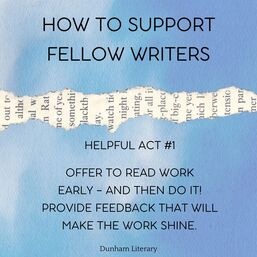 A great place to begin is by actively and unselfishly offering to be a reader of pre-published works. It can be harder than writers sometimes expect to get people to follow through with reading drafts of manuscripts. Be the friend that can be utilized as an alpha or beta reader that will commit to reading intentionally and providing feedback! And don’t stop at “This book was great!” You know how important empathetic and actionable advice is, and how much you’d like to receive it, so give generously! 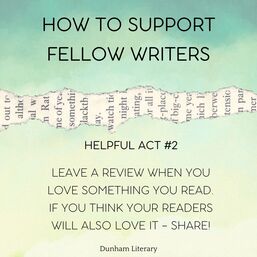 When you’ve finished a published book that you love, leave a review anywhere readers can find it! Word of mouth remains the very best marketing tool of them all. It's organic and meaningful, and it's the perfect way to support the #writingcommunity. Reading should be part of every writer's priorities, and reviewing or sharing what you've read is a small additional step with a big pay off for the person who write the book. If you love it; share it. Your friends and your audience will thank you for your sincere recommendation! 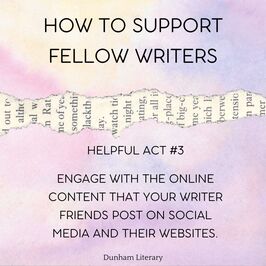 Engage with the online content that your writer friends post on social media and their websites. When you "like," "follow," and "share" your author friends' content, it makes it more discoverable, AND it boosts their confidence that their efforts are worthwhile. Even if you don't have time to comment, members of your #writingcommunity benefit greatly from those quick clicks, and will likely someday return the favor. If you do have time, pay it forward by leaving your kind thoughts for others to see. You might tip the scales to help someone else choose your friend’s book as their next read. 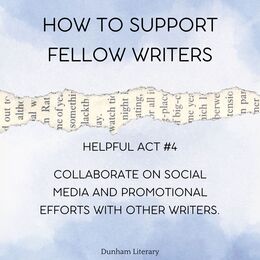 Collaborate on social media and promotional efforts with other writers. This is something you can begin long before you are published. One of the easiest ways to gain new followers on social media is to get in front of the audience of a writer friend who is engaging with your target audience. The two of you (or group of you) will naturally have some overlap in your readership, but there will be new people to interact with in your shared circles as well. A successful collaboration might look like a giveaway or contest, or it might be something like a book club, read-along, or special in-person event. Don’t be afraid to put your heads together and have some fun. 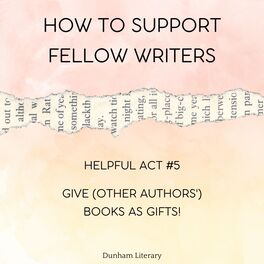 Give books as gifts! As you read books, make a goal of thinking about the people in your social sphere who would enjoy them. Then pass them on! Or if you can’t part with it or read the ebook/audio, purchase the book for your friend or family member for the next holiday. I know that I am personally much more likely to read a book quickly if it was given to me by someone who read it and knows it’s “my kind of book.” Special editions and signed copies of books also make excellent gifts. And how wonderful is it that you’re actually helping two people – your gift recipient and the author! 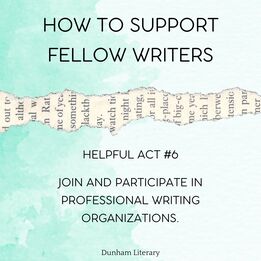 Join Professional Writing Organizations. Becoming a member of an organization like SCBWI, the Author’s Guild, Mystery Writers of America, or a local writing guild is an excellent way to get to know other writers. It’s also inherently supportive to the writing community as a whole. Your membership dues and your participation allow those organizations to offer robust programming and resources that will benefit everyone involved. As you get to know others in the writing community, you will have more and more opportunity to be on the receiving end of this kind of support. Forming strong bonds with writing friends is the best way to ensure you’ll be on their mind when they are looking for someone to partner with, and that bond often begins with a selfless gesture. We hope this post has inspired to take the first step!
By Anjanette Barr Even when you’ve accepted the oft-repeated truth that publishing is a slow process, it can be excruciating to wait for all the pieces to come together. Writing a manuscript can take significant time, but because that is active, you may find the stages between writing and publication surprisingly challenging.
Obviously, a good deal of patience is required in this career, but there are things you can do while you wait. Use the list below as a springboard for coming up with ways to be active in the in-between times. What to Do While You’re Waiting to Be Published: 1. Start a new project. When the revisions for your contracted manuscript are in, and you’ve handed your story off to the industry professionals who will run the next leg of the race for you, it’s time to get started on something new. Think both strategically and creatively! Is there a follow-up project that would be perfect for capturing the audience you are targeting with your current book? Or maybe your brain will turn to mush if you keep thinking about that topic and you need to do something completely different to reset your inspiration? Time writing is never wasted time. So keep up that writing habit while you wait for publication! 2. Research/find your target audience. Even though you will likely have some marketing support when you publish traditionally, you will always be the best person to talk about (and sell) your book. Do you know how to find the readers who will listen? Where are they hanging out? And what else are they reading? Get to know your target audience so that you can interact with them. It will make you a better writer to engage with the reading community and pay attention to how reader expectations change in your genre over time. 3. Grow your relationships. This one piggy-backs on the last suggestion. Part of your purpose in finding your audience is sales-related market research. But another big part is growing genuine relationships. The writing and reading community is wonderful to participate in actively – book people are good people! Do you have writer friends inside and outside of your genre that are cheering you on? Are you encouraging others? Participating in book clubs, writing groups, and social media can all be positive ways to grow relationships while you wait. 4. Create an Author Site Many authors think that they should wait to create an author website because they don’t think it’s important to have one pre-publication or don't know what to put on it. While that's understandable, there's a lot you can do to start thinking about your brand and create a home base online for yourself. Think of it as a calling card. It's a great tool for helping agents, editors, and eventually readers to get a sense of who you are and for you to show us that you are ready to be professionally engaged online. 5. Study Your Craft While you are waiting to find the perfect agent, or waiting for your agent to find the perfect editor, or waiting for the editor to bring your book into the world... keep learning! Pick up a book on worldbuilding, dialogue, non-fiction research, or even marketing. Think of this "down time" as "in between time" and use it wisely to become an even better writer! We have a long list of suggested books and resources right here on our website! 6. Take Deep Breaths The tough reality is that it can take two years from receiving an offer from a publisher to holding your book in your hands. There are teams of people invested in your work, and they all have jobs that take a certain amount of time. They are also coordinating with each other to make sure everything is in place to maximize the chances of your book reaching its audience and selling well. Authors are busy team members for certain parts of this process and will feel sidelined for others. Take some deep breaths and remember that you will be busy again soon. You know what they say about good things and waiting. by Anjanette Barr If you're among the majority of writers who loathe writing their manuscript synopsis, I hope I can impart some encouragement and motivation with today's post. It's true that the condensed writing required for a synopsis uses very different skills than writing longform. But, I promise that you have what it takes. In fact, YOU are the BEST person to write your synopsis because you have the fullest vision of your work's purpose. Before I get into my advice for making peace with the synopsis process, let's go over why a synopsis is so important:
But what is an author to do when they feel that their copywriting chops are just not up to the task of paring their 200 page manuscript down into a back cover blurb, query letter, or even one page synopsis? Here are some tips:
Don't forget that a true synopsis reveals the ending. Obviously a shortened version, like a back cover blurb, will be vague, but just like your story, your synopsis needs a strong finish. You might, like some authors I know and admire, even decide to begin with the synopsis when your next manuscript inspiration hits. A synopsis can be used in lieu of an outline if you are more of a "pantser" and don't mind modifying it as you go along. When you embrace the synopsis as a healthy part of the creative process, I hope you'll find that the outcome is so rewarding that you dread it less the next time you have to do it, and that you'll come to see the synopsis as more friend than foe. by Anjanette Barr .Do you have a great idea for a book?
Fantastic! You need to figure out your next steps. A book takes a long time to write, and it's a lot of work. Perhaps your first thought might be to find a publisher who will buy the book before you start writing. Why invest lots of time without the guarantee that a publisher will be interested? Or, you may wonder if you would be better off finding someone else to write it for you. Here's the tough news. Every book starts with a great idea. Great ideas are a dime a dozen. Agents and editors are eager for them, but agents can't sell (and editors can't buy) books without a proposal for nonfiction or a full manuscript for fiction. It's the execution of the great idea into a well-written book that really gets publishing professionals excited. If you've heard real estate agents say that the most important aspect of a house when going to sell it is "location, location, location," then the book equivalent is "execution, execution, execution." A good idea might pique the interest of an agent or editor, but the request to read actual pages will follow quickly. If you don't have the pages to send soon after receiving the request, agents and editors will move on to the next project. Not that they aren't interested, but in their eyes, you aren't ready with what they need to move forward. This means that you need more than a good idea before you send a query. You might be better off with someone else writing it if you are an expert in an area and don’t have time because you have a busy career already. This only works well, however, in a few scenarios. One is if you are willing to pay a ghost writer up front to complete a full manuscript before submitting. That's risky since there's no guarantee of publication. Another is if your book can be sold on proposal to a publisher for enough money to make it worth a writer's investment of time and effort before the whole book is written. These types of arrangements are viable almost exclusively for practical nonfiction (how-to, self-help books). For fiction, a good idea usually isn't enough to get a professional writer interested in joining your team. Another aspect of understanding that a great idea alone is not enough is that no two people will tell a story the same way. Retellings of familiar stories can be fresh and exciting even when the reader knows the basics because a writer's individual interpretation provides new insight to the characters, situations, and challenges. The plot might differ in each version in important but nuanced ways. The setting in a different time or place will influence how the characters act. And of course, each writer's voice is distinct. The artistic rendering is what elevates a great idea to a brilliant story. If the idea behind your story is the same or substantially similar to other books already published, then yours will be distinct because of all the parts of the story beyond the basic idea. The central idea gives the gist of what will happen in the story, but the parts that make it special can’t be conveyed in the idea. Since a writer's individual voice and presentation of characters and narrative arc are what make it unique, the idea alone cannot adequately convey a writer's individual artistry. Once you have a great idea, your next step might involve asking yourself some questions. What makes your story different from others? Is this idea fresh enough to stand out from other books already available? A great idea is the seed for every book, but alone it’s not enough to get a book deal. You’ll need to take the idea and craft it into your own, individual story. If you've got a great idea, then it's time to start writing! |
What's New?Keep an eye on this page for agency news, author interviews, and more! Archives
July 2024
Categories |
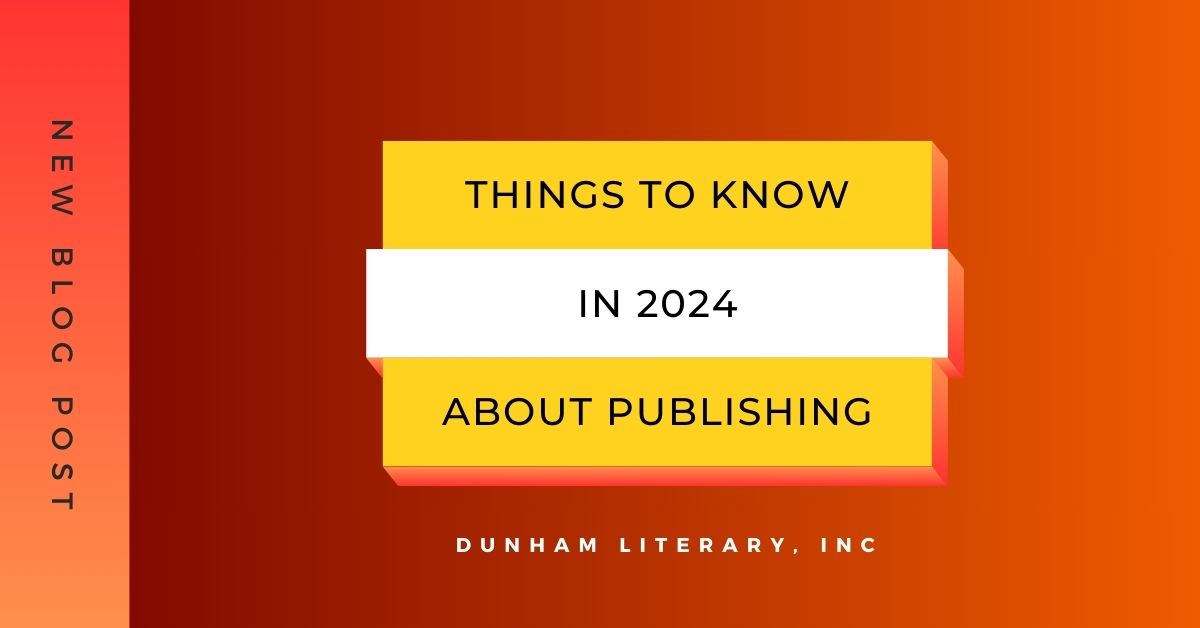
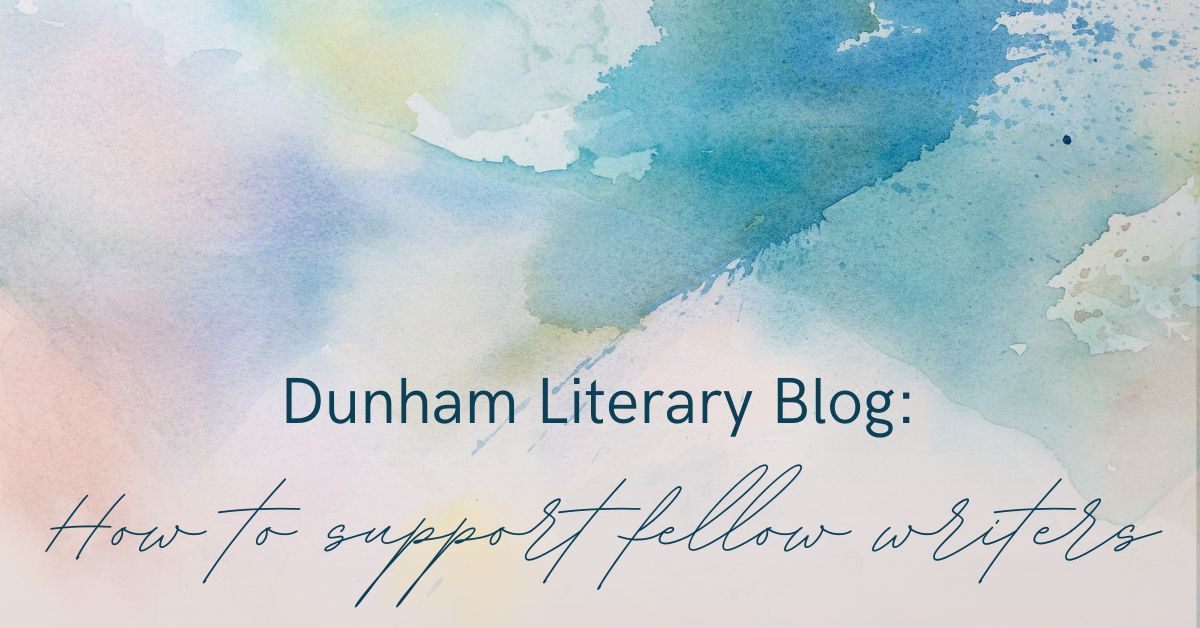
 RSS Feed
RSS Feed